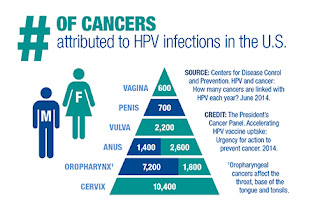Women’s Health 101: Your Sexual Health
These
are some of the most common issues that women face regarding their sexual
health, especially when they are in college. Getting the facts, making a plan, and taking care of yourself are important steps to staying healthy.
Unplanned Pregnancy
Many couples become pregnant without really thinking or talking about
it. So, If you are having sex and do not want to have a child now, a birth
control plan is the best solution.
Make a birth control plan. Learn about the different methods! Condoms are very reliable,
especially when used every time you have sex, for the entire time you are
having sex (consistently and correctly). Choose a method(s) that works for you. Think about your health history, values,
and lifestyle. You have lots of options, like pills, the ring, the shot, the implant, an intrauterine contraceptive, or even spermicides.
Don’t have sex if you’re drunk or high, you may forget the birth
control.
If you have a regular partner, TALK with them so they can support you
with your choice of birth control.
STI
(Sexually Transmitted Infections)
Sexually
transmitted infections are spread by close physical contact during vaginal,
anal or oral sex.
Some ways to keep from getting an STI:
You can abstain from sex until you find a partner you trust 100%. Being in a monogamous relationship with someone you trust. Use condoms correctly and with every partner the
entire time you have sexual intercourse. Avoid having sex if you’re drunk or
high; it can cloud your judgement and make it harder to use condoms correctly. Get
checked for STIs, every time you have a health exam, even if you don’t have
symptoms. Get tested more often if you are engaging in sexual behaviors without
a condom. Read facts about STIs, so you feel empowered and more knowledgeable.
Breast
Health
Breast cancer occurs in 1 out of 8 women. Early detection of
abnormalities is important for more successful outcomes if you do have cancer.
If you find a lump, that doesn’t mean it is breast cancer. Women can have
breast cysts and other lumps that are not cancer. But only a doctor can check
that out to be certain.
Self-Care
Doing a monthly self-check is good so that if you find something
abnormal you can get to a doctor for further testing. This is called a self-breast
exam. You do this every month, one week after your period has ended. Also,
discuss the best way to check your breasts with your health care provider or
with a health educator at your school.
Regular Breast
Checkups
A manual exam by your health care provider is done to feel for breast
abnormalities. All women who have an annual exam will have their breasts
examined and it only takes a few seconds.
Mammograms
A mammogram is an X-ray image of the breast. It is the most useful and
accurate screening tool to detect breast cancer. Ask your health care provider
how often you should have a mammogram. Most women will start mammograms on an
annual basis after age 40. But if you are at a higher risk for breast cancer,
it may start earlier.
If you would like further information on any of the topics above or have
any further questions or concerns please feel free to contact the CSULB Health
Resource Center or come to room 268 located in the Student Health Services building.
By Jazzmin Solis



This is very nice blog. It's provide lots of information will increase more and more people to know about all these type of Sexual Health Problems. Buy Libido Enhancer medicine online in Bangalore
ReplyDelete